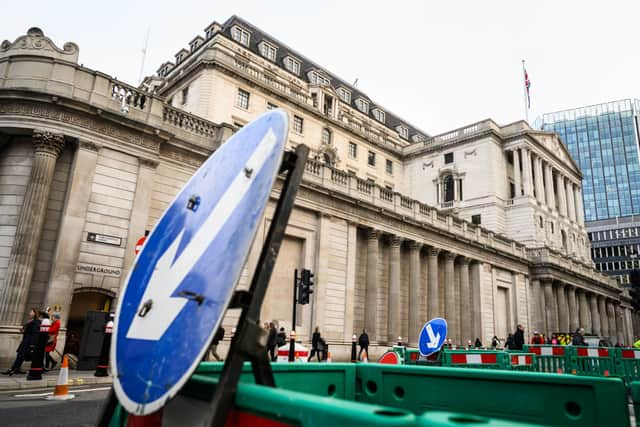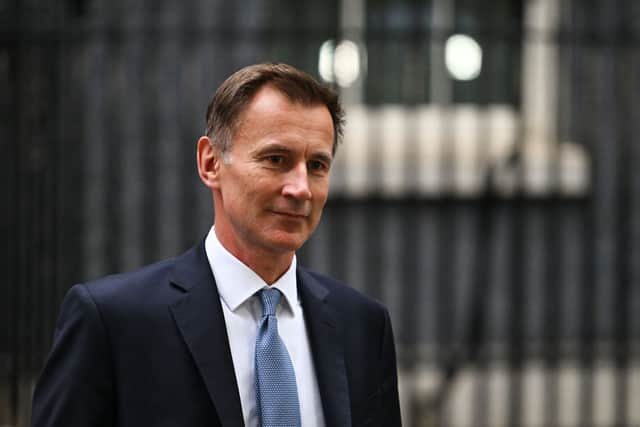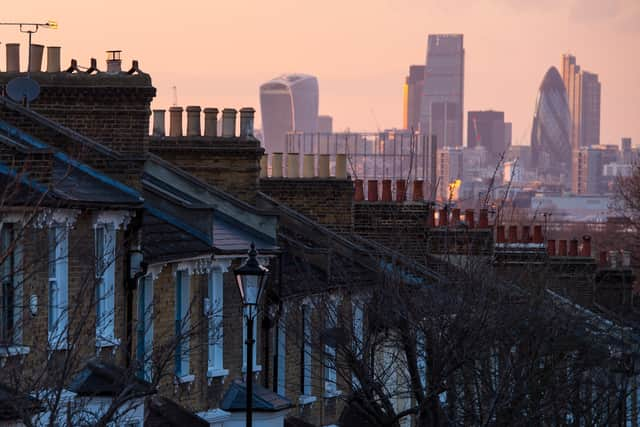UK interest rates: Bank of England raises base rate to 4% - what it means for mortgages and savings accounts
and live on Freeview channel 276
The Bank of England has announced yet another hike to interest rates, as the UK central bank continues to battle soaring inflation.
A new rate of 4% has been set - a 0.5 percentage point hike on the previous total. It is a fresh 14 year high and means the cost of mortgage repayments and the interest available on savings accounts are likely to remain higher for longer.
Advertisement
Hide AdAdvertisement
Hide AdBut in good news for borrowers, experts believe the anticipated rise will be one of the last in the short-to-medium term as the Bank of England base rate is forecast to peak at 4.25% or 4.5% in March. The bank’s governor Andrew Bailey says the UK “has turned a corner” on inflation thanks to a fall in wholesale energy prices and said he expects the forecast 2023 recession will be shallower and shorter than first thought.
The country’s economy still has a gloomy year in prospect, with the International Monetary Fund (IMF) warning at the end of January that it would be the only economy in the G7 to see a reversal in its GDP growth in 2023. It means the cost of living crisis is likely to be with us for some time yet.
It comes as wages are continuing to grow well-behind the rate of price rises, which means household budgets are still being eroded significantly. While overall inflation came down for a second month in a row in December 2022 - the latest month for which we have official data - food prices have continued to rocket.
Energy prices also remain much higher than a year ago, while mortgage repayments are still elevated - although to a much lesser extent than in the wake of Liz Truss’s mini budget.


‘Greater’ economic optimism
Advertisement
Hide AdAdvertisement
Hide AdWhile things are still looking gloomy in the UK economy, the Bank of England’s interest rates announcement was accompanied by a new prediction about the kind of recession the UK is on course to face in 2023 - and it is a much brighter forecast than what was being talked about in late 2022.
The central bank’s latest estimate says the UK will be in a recession for five consecutive quarters, with the downturn beginning in the first quarter of 2023 (i.e. January to March). It means it will be three quarters shorter than what was being predicted in November, when the bank hiked interest rates by the single largest amount since 1989.
Loading....
It will also be softer than the recession seen in 2008, with GDP expected to fall 0.5% over the course of 2023 and 0.25% in 2024 before recovering its losses in 2025, when 1% growth is expected. The outlook for the labour market is also looking rosier than initially feared, with unemployment rates expected to peak at 5.25% rather than the 6.5% that was initially forecast. Greater job security means greater consumer confidence, which is itself a boost to the economy and tax receipts.
But governor Andrew Bailey has sounded a note of caution, warning it is “too soon” to declare victory in the fight against rampant inflation. He said that while the rate of price rises will fall sharply over the second half of 2023, they would not return to the Bank of England’s target rate of 2% until Spring 2024.
Advertisement
Hide AdAdvertisement
Hide AdMarket analysts are also talking up a more positive outlook. While most believe the Bank of England will announce a further interest rate hike in March, they believe it is approaching the end of its cycle of successive rate rises - of which there have been ten over the last 12 months.
Speaking to the PA news agency in advance of the latest announcement, Societe Generale Global Economics said: “Even though the outlook is less gloomy than expected only three months ago, we still think a recession is likely and the MPC’s forecasts should continue to predict one for this year. This, and the mounting evidence of some cooling in the labour market, vacancies and job growth in particular, should lead the committee to contemplate an imminent end to tightening.”
This viewpoint was echoed by Investec Economics, whose chief economist Philip Shaw said: “Recent weeks have ushered in a greater sense of economic optimism. This has been driven partly by the mild European winter, which has helped to avoid a need for energy rationing, contributing to a substantial fall in current spot gas prices as well as gas price futures. In the UK, we are set for another year where real household disposable incomes are set to fall by about 3%, which will continue to squeeze spending and make a recession virtually unavoidable.”
What has the political reaction been?
The reactions of both the Conservative Party and Labour have indicated what kind of economic arguments we can expect to hear over the course of 2023. Chancellor of the Exchequer Jeremy Hunt welcomed the Bank of England’s decision and suggested it was a vindication of his and Rishi Sunak’s policy of austerity.
Advertisement
Hide AdAdvertisement
Hide Ad“Inflation is a stealth tax that is the biggest threat to living standards in a generation, so we support the Bank’s action today so we succeed in halving inflation this year,” he said. “We will play our part by making sure Government decisions are in lockstep with the Bank’s approach, including by resisting the urge right now to fund additional spending or tax cuts through borrowing, which will only add fuel to the inflation fire and prolong the pain for everyone.”


But shadow Chancellor Rachel Reeves insisted the latest rates rise should be viewed as the result of the “Tory mortgage penalty” for homeowners - an attack line the main opposition party has used since mortgage rates soared in the wake of Liz Truss’s mini budget. She suggested the hike was an indictment of the Conservatives’ economic record.
“Families across the country will be worried about what rising interest rates today mean for them,” she said. “The reality is that under the Tories, growth is on the floor, families are worse off and we are stuck in the global slow lane. We do not have to continue on this path of managed decline when Britain has so much potential to grow and thrive.”
The Prime Minister’s official spokesperson acknowledged the latest interest rates announcement could be “difficult” for mortgage payers.
What are businesses saying about interest rates?
Advertisement
Hide AdAdvertisement
Hide AdThe latest interest rates hike has led to calls from business leaders for the government to be ambitious with its upcoming Spring Budget.
Major business group the Confederation of British Industry (CBI) said it expects interest rates could still rise again. Its deputy-chief economist Anna Leach said: “The government needs to act decisively in the forthcoming Budget to reinforce the UK’s position as a global centre for innovation and the low carbon economy.”


Meanwhile, the Federation of Small Businesses (FSB) said the Budget ought to be “grasped as an opportunity for the government to promote a growth agenda”. Its national chairperson Martin McTague painted a gloomy picture of the economic challenges facing the country, adding: “Increased mortgage and loan costs will further dampen people’s willingness and ability to open their purses, spelling further pain in the short term for consumer-facing industries, which will inevitably feed through to other sectors as the situation persists.”
In the property market, experts warned the latest interest rates rise could further dampen demand from homebuyers. Forbes Advisor mortgage expert Laura Howard warned people would be “more worried than ever” about mortgage payments in light of the Bank of England’s announcement, adding that it could “further discourage” prospective buyers.
What is the Bank of England base rate?
Advertisement
Hide AdAdvertisement
Hide AdThe Bank of England looks after the UK’s currency - the pound. One of its primary roles as the UK’s central bank is to maintain the value of the currency.
Inflation essentially means the value of money is being eroded. If prices are rising and the value of money remains the same, the purchasing power of the pounds in your pocket is being eroded.
To counteract this erosion of the pound’s value, the bank sets a base rate every month or so. Very basically, this influences interest rates throughout the economy as it makes money more expensive to borrow, which reduces the amount of it flowing around the economy. The upshot of this activity is that the pound’s value is protected.


The Bank of England has a target of keeping inflation to 2% - a rate which is deemed to be healthy by economists as it is believed to encourage a healthy level of spending throughout the economy. But inflation soared throughout 2022 - reaching a high of 11.1% in October - which has forced the bank to continue increasing interest rates.
Advertisement
Hide AdAdvertisement
Hide AdOften, markets move ahead of the Bank of England, pre-empting changes to its base rate. This was most recently seen in the wake of Liz Truss’s tax cut-laden mini budget, which markets believed would fuel the UK’s inflation rate. Accordingly, mortgage rates soared.
Given inflation is forecast to reduce over the coming months - thanks to previous interest rate hikes, as well as the tax hikes announced in the November 2022 Autumn Statement - mortgage rates have softened as lenders have factored in lower base rate hikes than had previously been expected. So, the latest increase to interest rates is unlikely to have any immediate bearing on the cost of mortgage repayments.
But, it is expected to mean that higher interest rates will be with us for longer. So, expect high mortgage and savings rates to remain with us for a while yet.
It will also mean there is some economic pain in the offing for UK PLC, as high interest rates make it harder for businesses to afford to borrow money. Businesses tend to borrow money to fuel growth, so higher interest rates will mean it is harder for the overall economy to grow.
Comment Guidelines
National World encourages reader discussion on our stories. User feedback, insights and back-and-forth exchanges add a rich layer of context to reporting. Please review our Community Guidelines before commenting.
